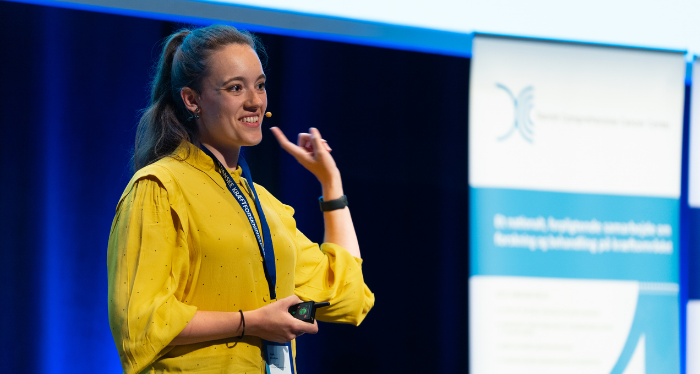
Tenna presenting on stage at Danish Cancer Research Days, DKD2021, Photo: DKD2021, Rune Borre-Jensen
17-12-2021
Between 20 and 30% of patients with colorectal cancer experience relapse - but we do not know which patients. To increase chances of survival, it is important to detect the cancer faster. Tenna Vesterman Henriksen on being able to identify patients at risk of relapse.
When patients with colorectal cancer stage 3 with spreading to the lymph nodes have been successfully operated, doctors are faced with a tough dilemma. A high number of patients will experience relapse. If the relapse is not detected in time, the patients risk dying. The doctor has two options: to treat the patient with chemotherapy or not.
“Currently, chemotherapy is the standard follow-up after surgery causing a hard strain on the body. Actually, between 70 and 80% do not need it”, says Tenna Vesterman Henriksen, PhD student at Department of Molecular Medicine, Aarhus University Hospital and Department of Clinical Medicine, Aarhus University. The research project is run within the framework of DCCC Danish Research Centre for circulating tumour DNA guided cancer treatment.
The goal is to be able to identify the patients who will actually benefit from chemotherapy and Tenne Vesterman Henriksen is testing a new and very promising tool to do just that.
“We need to isolate the group at high risk of relapse. We do that by examining the patients’ blood for ctDNA, released by tumour cells in the blood stream. If we find ctDNA in the patient’s blood after surgery, we know this patient has a seven-fold increased risk of relapse. In the future, our test can contribute to determine if the patient should receive chemotherapy or not”, Tenna says.
Tenna Vesterman Henriksen presented her research at Danish Cancer Research Days in August 2021 in front of 500 researchers, clinicians, decision-makers and patient representatives. She was selected among 200 submitted abstracts to the conference.
Only chemotherapy to patients with a high risk of relapse
The preliminary results indicate an effect of the chemotherapy as a number of patients avoid relapse.
“20% of those with ctDNA in the blood are expected to experience relapse and they avoid this relapse due to the chemotherapy treatment. This probably means that in the future we only give chemotherapy to patients where we find DNA from a cancer tumour in the blood”, says Tenna Vesterman Henriksen.
We are still challenged to find even more effective treatments.
Scans should be used in a targeted wayCurrently, scans are used to detect relapse. It is both expensive and difficult for patients during follow-up – especially when we know that not all patients will experience relapse. Researchers can identify the patients at risk of relapse quite early and who can benefit from the scans.
“In some cases, we could detect the tumour 10 months earlier by analysing the blood for ctDNA every third month compared with annual scans. This means that the cancer will have spread less and our possibility to treat the patients and save lives will be improved. Today, we often discover relapse so late that we cannot operate,” says Tenna Vesterman Henriksen.
Time is crucial. Researchers have discovered that some tumours grow slowly, and others develop very fast.
“The slow tumours grow by 27% every month and the fast tumours grow as much as 137%. This clearly shows that time is important to save patients’ lives,” says Tenna Vesterman Henriksen.
The researchers hope that we in the future will use ctDNA in follow-up every third month. The patients with cancer DNA in the blood must be followed up with frequent scans as it is necessary to localize the tumour to start the treatment.
Huge perspectives – but the method is not quite ready for implementation
Although results are promising, the method is not quite ready to be implemented in clinical practice. If all patients will not be treated with chemotherapy to avoid relapse, the researchers need to further test the method in more patients than the 168 patients who are currently part of the research project.
“Our results clearly show that our method has a huge potential, but we need more data and more knowledge before the Danish patients can benefit from this method,” says Tenna Vesterman Henriksen.
In the future we will probably see that the method will be implemented at hospitals across Denmark. The method can also be applied to other patients than those with colorectal cancer. The method can also be applied in other types of cancer, but the information doctors get on a cancer tumour by using ctDNA analysis differ. Thorough studies on the applicability of ctDNA must be made before we implement the method.
“Imagine a ctDNA analysis that shows you have cancer, but the doctors cannot locate and treat the tumour. This is unacceptable and we should only apply ctDNA where it makes sense in relation to diagnostics and treatment”.
